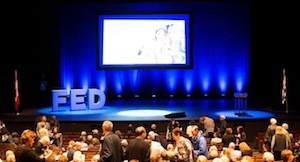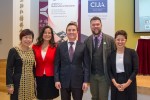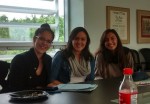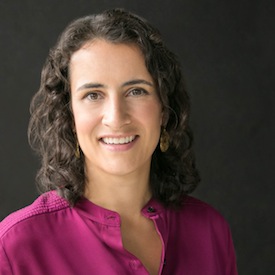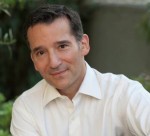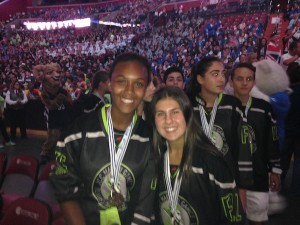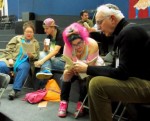Left to right, shinshiniot Ophir Golumbek, Tomer Tetro and Lian Swissa are volunteering with various organizations in the Greater Vancouver Jewish community. (photo from Jewish Federation of Greater Vancouver)
For the first time, Vancouver is participating in the Shinshin program through the Jewish Federation of Greater Vancouver (JFGV) in conjunction with the Jewish Agency for Israel.
Shinshin is an acronym for shnat sherut, meaning year of service, which is exactly what the three 18-year-olds who arrived on Aug. 31 are here to provide the Vancouver Jewish community.
The project, which is co-funded by JFGV and the beneficiary agencies, is an outreach program created by the Jewish Agency to give exceptional Israeli youth a meaningful gap-year experience that furthers the objectives of the Jewish Agency for promoting goodwill and education about Israel. According to Vancouver’s shinshin coordinator, Lissa Weinberger, the program has been wildly successful and popular among the Jewish communities that have had the chance to host Israeli teens in the past. JFGV had planned to begin hosting Shinshinim in 2016 but because of the enthusiasm of participating agencies, they fast-tracked the program and made it happen this year.
Shinshin has been embraced by communities in England, the Netherlands, South Africa, North America and South America, growing from 54 participants last year to 100 this year. The Israeli youths volunteer with young people in schools, synagogues, Jewish community centres and other Jewish organizations to build awareness and give access to a teen perspective on Israel. According to Weinberger, the program has been so effective at building relationships between Israeli and Diaspora Jewish youth that there is a plan to grow it to 300 Shinshinim within five years.
Weinberger said that the young women in Vancouver – Ophir Golumbek, Tomer Tetro and Lian Swissa – will be working six days a week for the next nine months, with a few weeks off spread over that time.
“When we were discussing their schedule, we were told to keep them busy. They were coming to give back, not sit around,” Weinberger said.
The Shinshiniot (feminine plural) will be hosted by local families during their stay, a different family every three months. The host family experience is crucial to the program as it gives the youths a soft landing here in Vancouver, in a family environment.
Jennifer Shecter-Balin will be hosting one of the Shinshiniot for the first term. She spoke for her family when she said, “We are excited for the experience. I have been communicating with Ophir via email and I have been thoroughly impressed by her maturity, enthusiasm and introspection.”
In an interview with the Jewish Independent the day after their arrival, the three young women were indeed bubbling with energy and enthusiasm. Golumbek will be working primarily with students at Vancouver Talmud Torah (VTT), with the Temple Sholom Sunday school as her Sunday job. Tetro will divide her time between the Jewish Community Centre of Greater Vancouver and Congregation Beth Tikvah. Swissa will be working with King David High School, Congregation Beth Israel and Richmond Jewish Day School.
Each one of the Israelis comes with a history of volunteerism and leadership, as well as an impressive command of English. None of them comes from an English-speaking home in Israel but all are eloquent and clear in their goals for their year of service in Vancouver.
Golumbek explained why she applied to the Shinshin program. “I have family in the U.S., third cousins, and they all went on Birthright and I saw how it made them [connected to] Israel. Some came back to study and one made aliya. Each one of my cousins told me about a person who influenced them to love Israel and I wanted to build that connection for people here.”
Swissa echoed Golumbek’s interest in building connections with local Jews and added, “I believe that Jewish people have a shared history and we should create a shared present and future. We are here to learn about Vancouver and Judaism outside of Israel, as much as we are here to share our love of being Jewish in Israel.”
It’s not surprising that 18-year-olds who can express these types of ideas when jet-lagged were selected from the 1,700 applicants to the Shinshin program. Swissa and Tetro have leadership experience and a strong basis in working with other Jewish teens from a two-year program they did in high school called the Diller Teen Fellowship, which brought them to Chicago and Baltimore, respectively, when they were in grades 10 and 11. Their experience working within a pluralistic Jewish environment has prepared them for their work in Vancouver. Golumbek participated in a special program of her Scouts called Seeds of Peace in Maine, which brought together Israeli, American, British, Palestinian and Egyptian teens to work on building relationships and tackling issues of conflict.
When asked how they feel about being away from their families, they all teared up slightly. Swissa is the youngest of seven children, so it’s a shock for her to be without family here, while Tetro will miss her 5-year-old sister. Golumbek has a brother who is finishing his army service this year and, while she said she will miss her family, she looks at this year as an opportunity to get ready for being away when she goes into the army, while making an impact and making new connections. She said, “Our host families will be like a new family … we are grateful for the chance to come here, to make a mark. Thank you is a small word for what everyone has done for us so we could be here.”
Tetro spoke for all three volunteers when she explained what they hope for the year to come. She said, “We are so excited because this is a brand new program and nobody knows what to expect, but we are also stressed because we want to make the best impression. We want to build a really good base for next year so all of the kids will be eagerly waiting for the next Shinshinim to come.”
Michelle Dodek is a freelance writer living in Vancouver.


